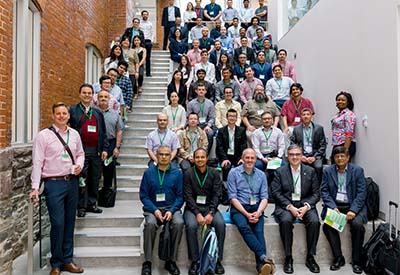Experts Share Knowledge on the Future of Energy Storage at NESTNet Week 2019

Aug 2, 2019
The Centre for Urban Energy (CUE) and the Natural Sciences and Engineering Research Council of Canada (NSERC) hosted the fourth annual NSERC Energy Storage Technology Network (NESTNet) Week, engaging numerous researchers, industry and governmental members from across Canada, the United States, Brazil, United Kingdom and Germany.
From June 17 to 20, members of the network came together to collectively learn, collaborate and share knowledge with one another about the world of energy storage. The four-day event encompassed an all-day summer school open to students of the NSERC network, a two-day technical conference open to NESTNet members with themed presentations, and Leading the Charge Conference, a public stage for all energy stakeholders to share their perspectives on the future of energy storage.
The first day of NESTNet Week was filled with initiative and collaboration as five teams made up of students and postdoctoral fellows took part in a one-of-a-kind energy storage design challenge.
Bala Venkatesh, CUE’s academic director, kick-started the day before Carlos Sabillon, an IESO research fellow at CUE and facilitator for the day, hosted a discussion before the challenge got underway.
Sabillion explained that the objective for each team was to “design innovative solutions to present-day or near-future challenges in the energy sector.” 
The second and third day of NESTNet Week welcomed numerous professors from across Canada to downtown Toronto for a series of project presentations aligned with NESTNet’s four themes: energy storage, power electronics converters, power systems integration, and economics and policy.
Individuals in the audience were engaged throughout the day and were able to benefit from not only the knowledge shared during the presentations but from networking with other NESTNet members.
Dario Peralta, a PhD student electrical and electronics engineering at the University of Waterloo, said that one of the highlights from the conference was learning more about thermal energy storage.
“NESTNet has engaged us for the past four years to know the different sources of energy that we can benefit from. From small-scale to large-scale projects, how we can increase production in different areas,” said Peralta.
The fourth and final day of NESTNet Week was filled with notable speakers that captivated the audience with a diverse range of perspectives on energy storage.
The conference began with welcoming remarks from Jessie Ma, an IESO research fellow at CUE, which was followed shortly by the first keynote speaker, Jocelyn Millette, director of CanmetENERGY in Varennes, Quebec, one of three major federal research centres that focus on clean energy technology.
Millette said that the challenge is to keep electricity generation as clean as possible by integrating renewables and that is where energy storage comes into the picture.
“How can we shift the consumption to provide room for renewable energy into the grid? It has to be designed differently than what it was in the past to take the distributed energy resources into account,” he said.
In a panel session on energy for smart cities, Adrian Thomas, panelist and vice president of building at Schneider Electric, said that it is important to look at energy within the city “in terms of not just generating more efficiently but consuming more efficiently.”
“If we want to achieve really solid benefits of energy management, we can’t forget to look at the consumption of energy. If we’re going to achieve sustainability goals, we can only do that if we decrease our consumption of energy,” he said.
Some other notable speakers and panelists from the conference included Sören Hohmann, head of the Institute of Control Systems at Karlsruhe Institute of Technology, Shuvo Chowdhury, senior director of strategy at Amp, Harneet Panesar, director of strategy and integrated planning at Hydro One and Neetika Sathe, vice president of the Green Energy & Technology Centre at Alectra.
In a bid to accelerate commercialization of NESTNet’s projects, the final session provided a platform for researchers to bring their projects to the marketplace in partnership with industry attendees.









![Guide to the Canadian Electrical Code, Part 1[i], 26th Edition– A Road Map: Section 56](https://electricalindustry.ca/wp-content/uploads/2022/11/Guide-CE-Code-2.png)






